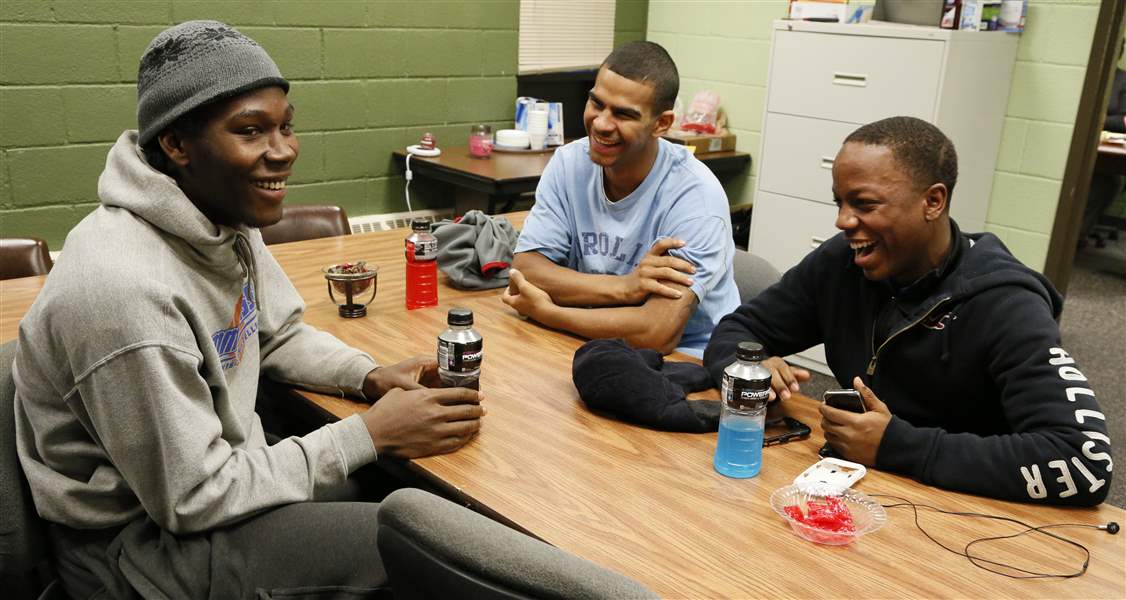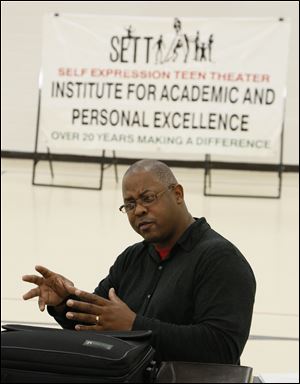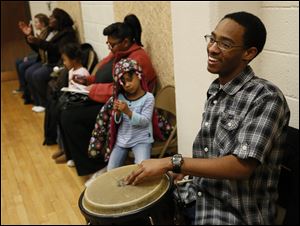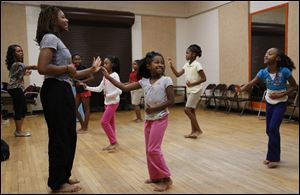
Community center lifts residents of central city
12/16/2012
James Evans, 20, left, Derrick Ward, 19, center, and Timothy Harris,17, joke around at the Frederick Douglass Community Center in central Toledo. The trio enjoy playing basketball at the center.
THE BLADE/JEREMY WADSWORTH
Buy This Image

Washington Muhammad coordinates the center's Self Expression Teen Theater, an after-school program in which teens perform skits and talk about the risks of sex, alcohol, tobacco, gangs, and other issues. 'When teens talk to teens, it’s not corny or preachy,' Mr. Muhammad says. 'The message is received.'
The blocks around the Frederick Douglass Community Center in central Toledo haven’t felt much of the so-called economic recovery. In the hood, the recession is permanent, with real unemployment rates nearing 50 percent. Vacant buildings and homes, some havens for drug dealing or scavenging for copper and aluminum, lace the neighborhoods.
But contrary to what you read, that’s not the whole story. The resurgent community center, sometimes called “The Doug,” is giving a dose of hope to central Toledo.
A new 19-member board of directors — almost all have served about a year or less — and Executive Director Sonya Williams, who started in September, have the building at 1001 Indiana Ave. as clean as the board of health. And despite a near financial crisis, including a 50 percent cut by the United Way of Greater Toledo this year, they’re rolling out new education and training programs for youth and grown folks. Working with other community groups, they also plan an ambitious Empowerment Zone Initiative to restore housing and provide job skills, including green technologies, for disadvantaged young adults.
“For a long time, the institution focused on recreation — I’d like to be able to serve the entire family,” Ms. Williams told me last week.

Brandon Benson, 17, plays the drums during an ethnic dance class at the Frederick Douglass Community Center.
For young men — some caught up in a recent wave of gun violence — Frederick Douglass has become a haven and guiding light. It runs its own open-gym basketball program and sponsors the city’s late-night games. Players like James Evans, 20; Derrick Ward, 19; and Timothy Harris, 17, compete and show their skills, when other recreation and community centers have closed and the YMCA remains too expensive or out-of-reach for many young people.
“I can do what I love here and keep out of trouble,’’ said Timothy, a senior at Horizon Science Academy who wants to study education or medicine.
Shooting hoops at the center, Derrick said, provides an alternative to “all the drama that happens at parties, gang-related violence and different things. It’s somewhere to be to help you succeed and achieve.”
Basketball draws them to Frederick Douglass, but the three young men also want to check out other programs, including tutoring, to help them reach their goals. Derrick wants to go to college and open a restaurant or youth center. James, who’s working on his high school diploma at Glass City Academy, plans to work in construction.
“It’s a positive place, and there’s a lot of positive people here,’’ James said.

James Evans, 20, left, Derrick Ward, 19, center, and Timothy Harris,17, joke around at the Frederick Douglass Community Center in central Toledo. The trio enjoy playing basketball at the center.
Starting in January, Sisters of Strength, a nonprofit that tutors women seeking a GED, will occupy an office at Frederick Douglass, where students can use the center’s third-floor day-care center, said S.O.S. Executive Director Glenda Hayes.
In the last two months, the center received a $10,000 grant from First Third Bank and a $12,000 grant from Ronald McDonald House Charities for a computer lab that opens in January, as well as a larger initiative, called the technology zone, to provide workplace and financial literacy training.
Central City Citizens — part of Empowering and Strengthening Ohio’s People, or ESOP — is based at Frederick Douglass and conducts monthly meetings there. Community organizers James Jones and Nathan Edminster have helped neighborhood residents advocate for better street lighting, demolition of abandoned buildings, and other improvements.
Head Start and the Youth Opportunity Program, helping teenagers with jobs and school, also operate in the building. And this summer, a community group, Aspiring Young Men and Women, started ballroom dance classes for teenagers at Frederick Douglass.
Teneashia Cunningham, 36, the center’s new program coordinator, continues to talk to young people to develop programs relevant to them.
The Frederick Douglass Community Association, founded in 1919, moved to its current building, the J.B. Simmons, which it leases from the city, in 1979. In recent years, poor management and board turmoil reduced the influence of this historic association. The new board and director, however, are committed to making Frederick Douglass, again, a foundation of Toledo’s central city. Board Chairman Karl Parker told me he aims to increase the center’s annual operating budget to $1.5 million by 2015.
Unfortunately, Frederick Douglass continues to pay for past mismanagement. After the United Way reduced funding from $80,000 to $40,000, the center’s annual operating budget dropped to $175,000, down from $330,000 in 2006.

Jayla Satterfield, 17, teaches Nacheyl Geer, 8, center, and other youngsters ethnic dance at the community center.
Even with chump change, however, the center is starting to work miracles. I stopped by on Tuesday night last week and found Toledo School for the Arts senior Jayla Satterfield, 17, teaching 10 girls, from the third to eighth grade, the moves and meaning of African dance. With graceful staccato movements, they concentrated on Jayla’s instructions, circling to the drum beats of TSA senior Brandon Benson, 17.
Upstairs, a dozen teens, under the tutelage of Washington Muhammad, conducted a hip-hop skit, spitting rhymes about self-esteem and avoiding teen-pregnancy. It’s all part of Self Expression Teen Theater, an after-school program in which teens perform skits and talk about the risks of sex, alcohol, tobacco, gangs, and other issues. “When teens talk to teens, it’s not corny or preachy,” Mr. Muhammad told me. “The message is received.”
Before coming to Toledo two months ago, I lived in the city of Detroit for 15 years. The urban problems I witnessed, and wrote about, there mirror those, on a smaller scale, I see here. So do the solutions.
Last spring, I moderated a panel for the Detroit Branch NAACP on mass incarceration. There, a bright young man of 20 said he had stolen 120 cars as a teen. He was good at boosting cars, and it gave him recognition and even pride. I asked him what would have made a difference.
“Something positive to do,’’ he said.
A lot of young Toledoans are also looking for something positive to do, and not finding it. Maybe it’s not the whole answer to the culture of violence, but it’s a good start. If we keep fearing, shunning, and demonizing these kids, we will continue to watch some of them waste their talents, destroy their lives, and tear up their communities.
Or we can give them opportunities to grow and be recognized for something other than violence and self-destruction. Under new leadership, the Frederick Douglass Center is making a difference by doing just that. It’s time the rest of Toledo got behind it.
Jeff Gerritt is deputy editorial page editor of The Blade.
Contact him at: jgerritt@theblade.com or 419-724-6467. Follow him on Twitter @jeffgerritt